Shelter Press
Shelter Press
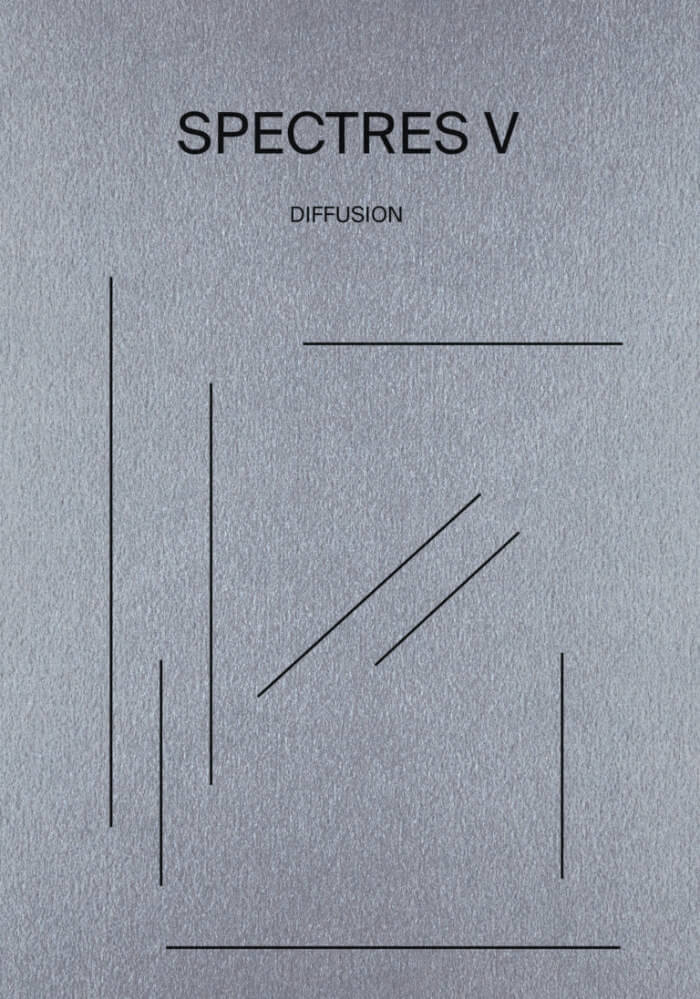
Spectres #05 – Diffusion
François J. Bonnet, Bartolomé Sanson
The fifth issue of the annual publication dedicated to sound and music experimentation, co-published by Shelter Press and Ina GRM – Groupe de Recherches Musicales, on the theme of diffusion and dissemination.
In a 1955 pamphlet entitled Seven Years of Musique Concrète, Jacques Poullin wrote:
"[...] sound projection in a concert hall is a logical extension of the concerns of the Groupe de Recherches de Musique Concrète and requires its technicians to properly study multiple aspects of the problems of sonorisation that are often neglected and to date have been almost exclusively the preserve of 'public address' technicians".
From the very beginning, fixed media electroacoustic music in its various guises faced a significant challenge: that of how it could be shared with the public. Even before it was distributed in the form of records, musique concrète, having first been transmitted on radio, soon turned to the concert stage. From the time of its birth, a twofold question was posed: What strategy of diffusion could be used for this music which involves no live performers? But also, how could it make use of existing systems of sound amplification without losing its singular nature, making sure to preserve its own particularities? Identified very early on, these questions have lost none of their pertinence some seventy years later.
Under pressure from the cultural industries and faced with a largely commercially-driven standardisation of formats, it is important today to reaffirm both the singular nature of experimental electroacoustic practices, and the possibilities these practices open up beyond standards and rules.
This calls for an exploration of the vast domain of sound creation in which, here and there, ideas, concepts, and sometimes new works appear that fully embrace the question of the deployment of sound, its dissemination and its expansion. An exploration focussed on the listening experience—a fundamentally musical experience—but adopting a critical approach which may sometimes call into question traditional ways of sharing and listening to sound, the status of listener and creator, and which may even challenge the acoustic integrity of venues and the legitimacy of diffusion systems.
Such are the questions to be addressed here. Sketching out the contours of what is quite obviously a huge subject, this volume, drawing upon a wide variety of points of view, experiences, and ideas, hints at an entire critical apparatus that remains to be developed and consolidated, but is crucial given the primordial importance of the theme of dissemination. For dissemination is the transitional stage par excellence, the uncertain stage that sits between creation and reception while at the same time determining both. It is a critical stage, yet one that is often neglected or, as Poullin says, left to a technical intermediary who may impose conditions entirely exogenous to questions of music and listening.
For these reasons, it seems more necessary than ever to return to the experience of sounds, to once again listen attentively to their trajectories, their diffraction in space, their emergence and their disappearance. To get to grips with the mysteries of their deployment so as to reaffirm that this deployment is essential to them.
Edited by François J. Bonnet and Bartolomé Sanson.
Contributions by Marja Ahti, Scott Arford, Nicolas Debade, Michael Gatt, Tim Ingold, Rolf Julius, Jules Négrier, John Richards, Marina Rosenfeld, Hildegard Westerkamp, Randy Yau.
Spectres is an annual publication dedicated to sound and music experimentation, co-published by Shelter Press and Ina GRM – Groupe de Recherches Musicales.
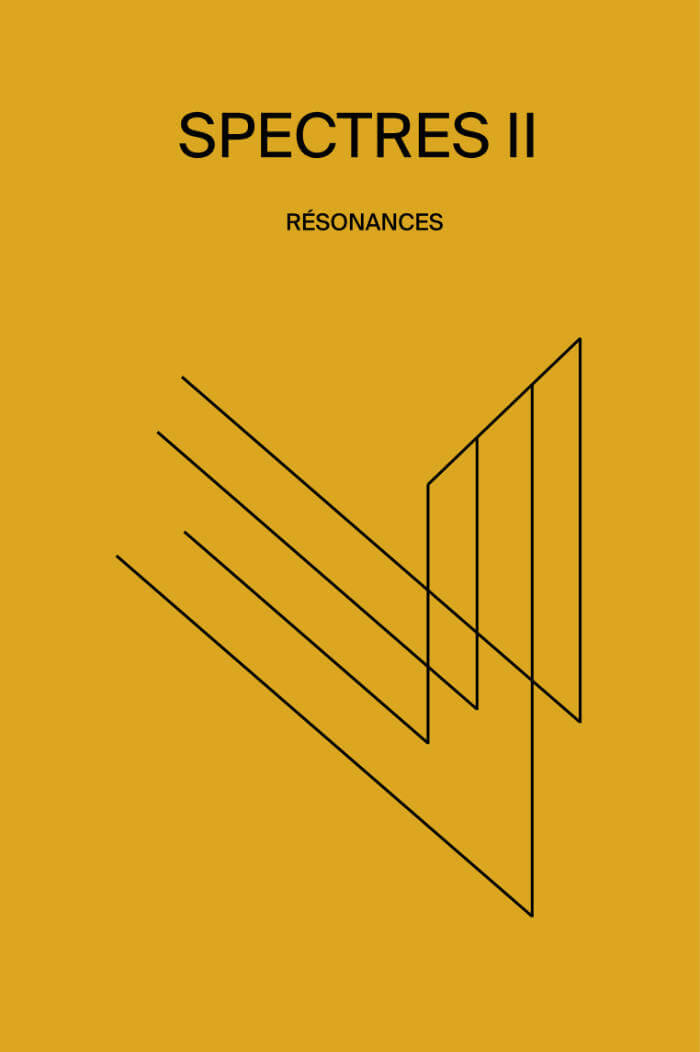
Spectres #02 – Resonances
Bartolomé Sanson, François Bonnet
The second issue of Spectres is devoted to the concept of resonances, with contributions by Maryanne Amacher, Chris Corsano, Ellen Fullman, Christina Kubisch, Okkyung Lee, Pali Meursault, Jean-Luc Nancy, David Rosenboom, Tomoko Sauvage, The Caretaker, David Toop, and Christian Zanési.
To resonate: re-sonare. To sound again—with the immediate implication of a doubling. Sound and its double: sent back to us, reflected by surfaces, diffracted by edges and corners. Sound amplified, swathed in an acoustics that transforms it. Sound enhanced by its passing through a certain site, a certain milieu. Sound propagated, reaching out into the distance. But to resonate is also to vibrate with sound, in unison, in synchronous oscillation. To marry with its shape, amplifying a common destiny. To join forces with it. And then again, to resonate is to remember, to evoke the past and to bring it back. Or to plunge into the spectrum of sound, to shape it around a certain frequency, to bring out sonic or electric peaks from the becoming of signals.

Spectres I: Composer l’écoute / Composing listening
Bartolomé Sanson, François J. Bonnet
[ENG]
This book has been conceived as both a prism and a manual. Following the “traditional” arc of electroacoustic composition (listen—record—compose—deploy—feel), each of the contributions collected together here focuses in on a personal aspect, a fragment of that thrilling territory that is sonic and musical experimentation. Although the term “experimental music” may now have be understood as referring to a genre, or even a particular style, we ought to hold on to the original use of this term, which was based more on an approach than on any particular aesthetic line to be followed. The experimental is first and foremost a spirit, the spirit of the exploration of unknown territories, a spirit of invention which sees musical composition more as a voyage into uncertain territories than as a self-assured approach working safe within the bosom of fully mapped out and recognized lands.
Authors: Félicia Atkinson, François Bayle, François J. Bonnet, Drew Daniel. Brunhild Ferrari, Beatriz Ferreyra, Stephen O’Malley, Jim O’Rourke, Eliane, Radigue, Régis Renouard Larivière, Espen Sommer Eide, Daniel Teruggi,
Chris Watson.
[FR]
Le livre qui suit a été pensé comme un prisme et un manuel. Suivant l’arc « traditionnel » de la composition électroacoustique (écouter — enregistrer — composer —déployer — ressentir), chacune des contributions regroupées ici pointe un aspect personnel, fragment de territoire passionnant qu’est celui de l’expérimentation sonore et musicale. Si le terme de musique expérimentale a pu être assimilé à un genre, voir à un style, il ne faut pour autant pas oublier l’usage initial de ce terme, qui était basé plus sur la démarche que sur la ligne esthétique adoptée.
L’expérimental, en effet, est d’abord un esprit, un esprit d’exploration des territoires inouïs, un esprit d’invention qui voit dans la composition musicale plus un voyage vers des terres incertaines qu’une démarche assurée produisant dans le giron de terres balisées et reconnues.

Spectres IV: A Thousand Voices
Bartolomé Sanson, François J. Bonnet
The fourth issue of the annual publication dedicated to sound and music experimentation, co-published by Shelter Press and Ina GRM – Groupe de Recherches Musicales, around the topic of voice.
The voice is everywhere, infiltrating everything, making civilisation, marking out territories with infinite borders, spreading from the farthest reaches to the most intimate spaces. It can be neither reduced nor summarised. And accordingly, when taken as a theme, the voice is inexhaustible, even when seen in the light of its very particular relation with the sonic or the musical, as is the case in most of the texts collected in this volume. There is no point therefore in trying to circumscribe or amalgamate the multiple avatars of the voice. We must rather try to apprehend what the voice can do, to envisage its landscape, its potential effects.
Spectres is an annual publication dedicated to sound and music experimentation, co-published by Shelter Press and Ina GRM – Groupe de Recherches Musicales.
Edited by François J. Bonnet and Bartolomé Sanson.
Contributions by Joan La Barbara, Sarah Hennies, Peter Szendy, Youmna Saba, Lee Gamble, Ghédalia Tazartès, David Grubbs, Stine Janvin, Pierre Schaeffer, Akira Sakata, Haela Ravenna Hunt-Hendrix, Yannick Guédon, François J. Bonnet, John Giorno.

The Whisper
The Whisper is Félicia Atkinson's new artist's book, bringing together photographs, drawings and poems. They revolve around the eponymous installation located on the pointe d'Agon, on the west coast in Normandy. On a dune acquired by the artist for the Conservatoire du Littoral, stands a pierced wooden sculpture. Around this sculpture, inside this wild dune and facing the sea, the walker is invited to become a whisperer, and listen to what surrounds him.
What if whispering could be a metaphor for a way of creating and living within biodiversity? Observing and listening, being present to the world while only leaving gentle trace? The studio then becomes a garden, the exhibition space a dune, deep listening a method of working and exchanging with the public and the reader.
Experimental musician, sound and visual artist Félicia Atkinson (born 1981) lives on the wild coast of Normandy (France). She has played music since the early 2000s. She has released many records and a novel on Shelter Press, the label and publisher she co-runs with Bartolomé Sanson.
For Félicia Atkinson, human voices inhabit an ecology alongside and within many other things that don't speak, in the conventional sense: landscapes, images, books, memories, ideas. The French electro-acoustic composer and visual artist makes music that animates these other possible voices in conversation with her own, collaging field recording, MIDI instrumentation, and snippets of essayistic language in both French and English. Her own voice, always shifting to make space, might whisper from the corner or assume another character's tone. Atkinson uses composing as a way to process imaginative and creative life, frequently engaging with the work of visual artists, filmmakers, and novelists. Her layered compositions tell stories that alternately stretch and fold time and place, stories in which she is the narrator but not the protagonist.
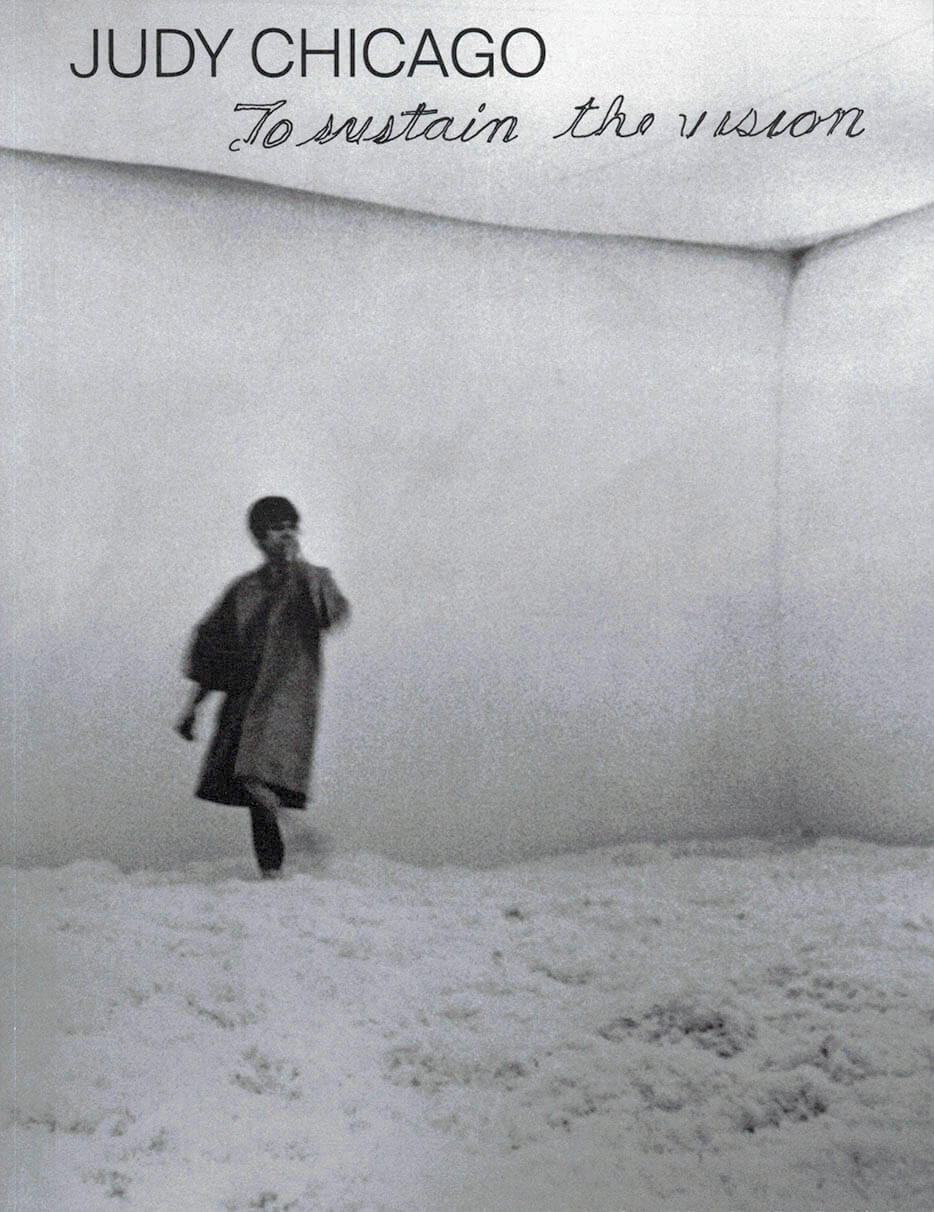
Judy Chicago: To Sustain The Vision
Monograph bringing together some fifty works by Judy Chicago and unpublished documents, accompanied by three critical texts by Géraldine Gourbe.
Judy Chicago says she wants to live as long as possible; not to transcend her mortal condition, but to be around as her works successively find recognition. A woman holding out against all odds: such is the image of an artist more a visionary than the pioneer she has so often been described as. Unlike the pioneers, Chicago has never joined the “greats” of the white, modernist, Eurocentric canon. Rather she has avoided this historical snare, urging instead the alternatives of to sustain the vision.
Géraldine Gourbe is a philosopher, author, art critic, and curator.
Published May 2020
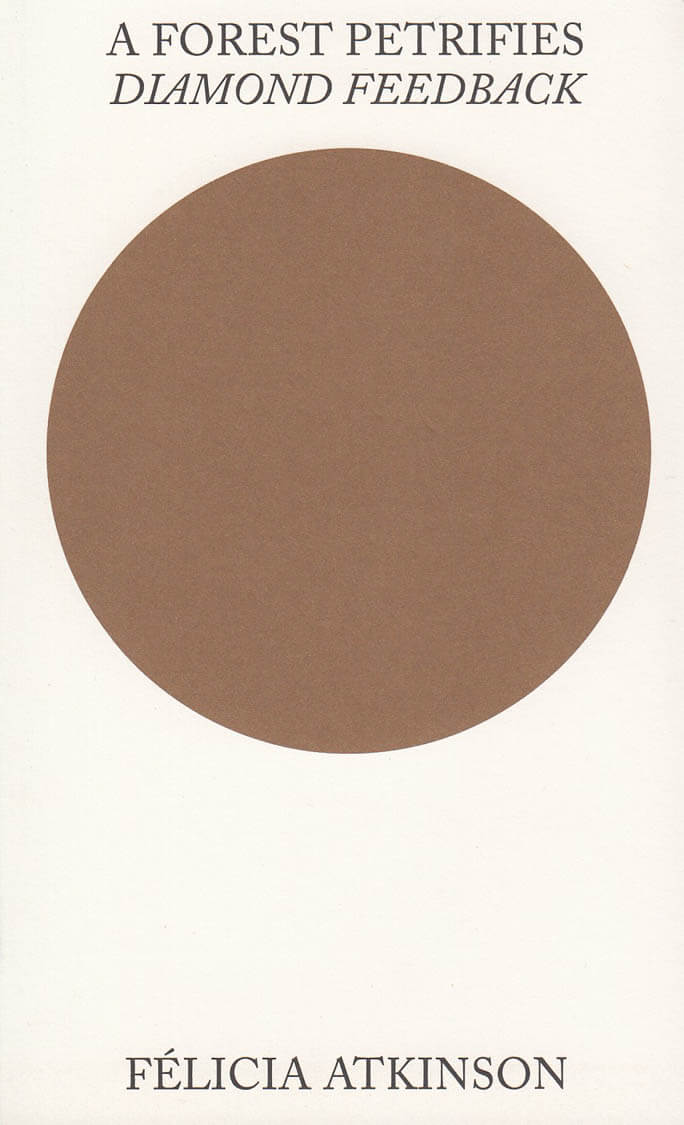
A Forest Petrifies – Diamond Feedback
The first part of a larger novel in several episodes: a text about the perception of time and how some places mark people's minds.
Inspired by the Petrified Forest in Arizona and its ability to change over time from an organic to a mineral state, the story was concieved by the musician and artist Félicia Atkisnon over the past five years, while its on-going writing has been the starting point of many of Atkinson's music lyrics and recent records and exhibitions.
A part of the book takes place in the middle of the desert in an indistinct future. Two men are having a discussion by a fire in a modernist house. The music they are listening to is not emitted by a device but by themselves, it's a new kind of technology. They look at the embers of the fire and it reminds them of a painting by Jeronemus Bosch. They suddenly wonder if those embers could be a republic of some kind.
A Forest Petrifies is a novel about the perception of time and how some places mark people's minds.
Félicia Atkinson (born 1981 in Paris, lives and works in Brussels) is graduated with Honors from l'Ecole Nationale Supérieure des Beaux-Arts de Paris and studied also anthropology and contemporary dance. She is a sound and visual artist, an experimental musician and the co-publisher of the independent imprint Shelter Press. Her paintings, drawings, sculptures and musical compositions are mostly abstract. Her work takes its sources from the American tradition of painting (Morris Louis, Cy Twombly, Richard Tuttle) and from avant-gardes figures who worked on chance and randomness (Fluxus, John Cage, La Monte Young...) as much as feminist figures in music and art.
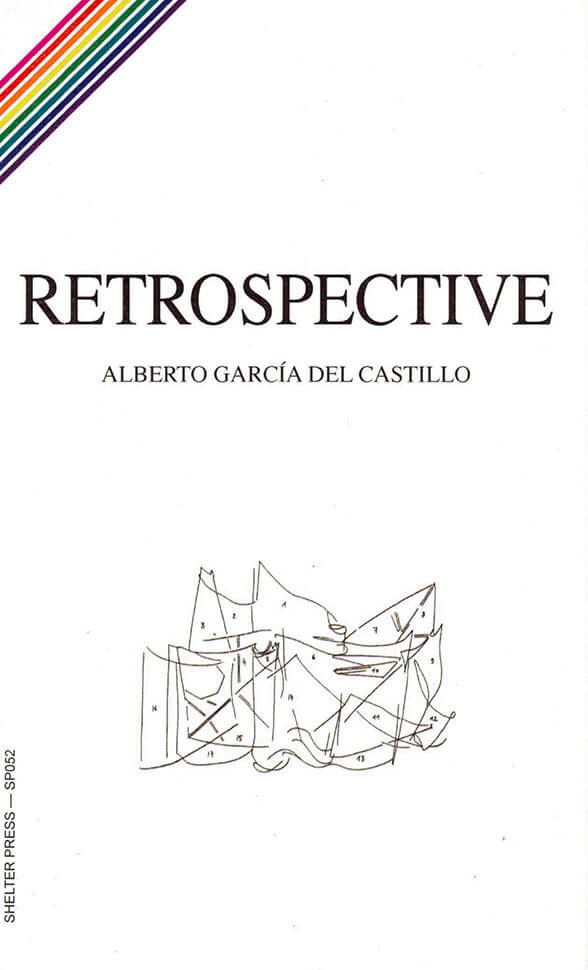
Retrospective
Retrospective is a comedy-science-fiction novelette about “faggotry” and the art world; depicting a retour-au-passé in contemporary painting and waving to some of the most beautiful homosexuals on Earth. Flaunting otherness, the alert reader can follow a clerk of The Land of Sculptures whilst he encounters the pretty faces of The Painter, The Foreign Painter, The Tyrolese Painter and other people doing art and drugs.
Retrospective includes “Thumbs-Up”, a superficial analysis of the normalisation of gayness; “Why Homos Are Better”, a masterpiece of investigative journalism in two parts, that originally appeared in Agony 2 (circa 1988–93), a zine edited by B. Boofy and William Bonifay; a drawing by Jurgen Ots; a photograph by César Segarra; and a poem by Lars Laumann.
Alberto García del Castillo writes genre fiction and nonfiction about communities and queer, performs his own and other people's writings, and collaborates in multiple configurations. He has published his writing in Girls Like Us, co-edited Midpoint (Théophile's Papers, 2016) and his two novels Merman (2017) and Retrospective (2014) were published by Shelter Press. Alongside Marnie Slater, is co-curator of Buenos Tiempos, Int.